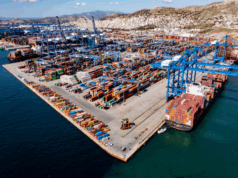 50 years old and still going strong: in 2016 the world’s leading travel trade show will be celebrating its 50th anniversary. Taking as its slogan ’From Berlin with Love’, ITB Berlin has launched a major anniversary campaign in cooperation with the airline airberlin. 50 ambassadors of ITB Berlin travelled to 50 destinations around the world where they met 50 representatives and had fascinating encounters. These meetings produced interesting, fascinating and unusual stories which can be discovered on the website at www.itb50.com. All of these stories will be compiled in a book which is due for release at the next ITB Berlin.
50 years old and still going strong: in 2016 the world’s leading travel trade show will be celebrating its 50th anniversary. Taking as its slogan ’From Berlin with Love’, ITB Berlin has launched a major anniversary campaign in cooperation with the airline airberlin. 50 ambassadors of ITB Berlin travelled to 50 destinations around the world where they met 50 representatives and had fascinating encounters. These meetings produced interesting, fascinating and unusual stories which can be discovered on the website at www.itb50.com. All of these stories will be compiled in a book which is due for release at the next ITB Berlin.
Fredy Gareis, a journalist from Berlin, and Bjørn Harvig, a travel writer, met up in Copenhagen. Both are passionate about cycling and have explored many parts of the world on their bikes. They first met each other in Ukraine in 2007 and have been friends ever since. It was Bjørn Harvig who gave Fredy Gareis the idea of cycling from Tel Aviv to Berlin, who has now written about his experiences in a book. Copenhagen was the ideal place to talk about cycle tours and tourism by bike, as the Danish capital has long since become a mecca for cyclists: around 55 per cent of the population cycle to school or work.
What is the reason for you doing exceptionally long and adventurous cycling tours?
Fredy Gareis: When you travel by bike it is easy to meet people, you have an instant connection. There is no need to build up trust like a journalist normally has to do. People think you are either harmless or an idiot for making such an effort: “They only use a bike because they don’t have a car”. So most of them are keen to talk to you.
Bjørn Harvig: You pass roads that tourists normally don’t see. When I arrive at a village, the bike is generally an attraction. In many places people actually want to leave and so they are happy that you have come to visit. What is really surprising to me is how people offer you their friendship without you asking for it. I call them my “unknown friends”.
What have you learnt about yourself during these long trips?
BH: That it’s not about the distance you travel or the speed you go. It’s about trying to focus on being where you are at that moment. Most of the time the things you really want to experience turn out not to be the greatest. It’s at places where you least expect it that something always happens. You learn to give yourself time to stop and get lost.
FG: The lesson I have learned is similar to the one a climber has to learn, too. You will get frustrated if you constantly look at the top. Step-by-step is the key.
How do you transfer your experiences into books?
FG: I keep a detailed written diary every day. The beauty is in the details and you have to make sure you don’t forget them.
BH: Same here. The diary is a lifesaver, too. The writing gets you through bad days because it gives you a sense of: “I am doing this because I hope to gather some stories that people might want to read”. Also, the stories become more precious to me through the diary. We don’t talk to presidents or politicians but to normal people that have never told their story before.
Would you say the number of bicycle travelers has increased in recent years?
BH: Yes, I think so. Many people don’t want to buy a package tour; they want to plan their trips themselves.
FG: I am not sure about this development. The number has increased but many plan their trip in a secure and technical way. GPS is getting bigger, but isn’t it about getting lost? I guess in the near future, with GPS so prevalent, there will be cycle trips that combine adventure and convenience. We never use GPS, we use paper maps. Technical progress is generally a good thing but overplanning can weaken the experience, it is no longer an adventure.
Regarding cycling, do you think one can compare Copenhagen to Berlin? Does Copenhagen live up to its name of “bicycle capital”?
FG: We don’t have enough bike lanes in Berlin and the behavior on the roads is quite aggressive. But it is still a good city compared to many others. Copenhagen is way better though.
BH: In Copenhagen they try to make it easy for cyclists because everyone cycles. We have a superhighway through the city and at the red lights there are panels to rest your feet. Also, there are roofs above the traffic lights so you don’t get wet on rainy days. We also have rotating garbage cans so you can throw away your banana peel while riding. They do a lot. I guess we have earned the title “bicycle capital”.











